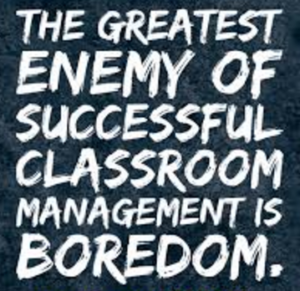“Civilization advances by extending the number of operations we can perform without thinking about them.” —Alfred North Whitehead
 When Napoleon Bonaparte was promoted to general, none of the prestigious French generals wanted to fight a lost battle beforehand against the Austrian empire. Therefore, they decided to send Napoleon to lose that battle. Napoleon’s perspective was entirely different from the other generals. He did not see a disaster; he saw an opportunity to ascend to power. Since I read this story, I always wondered, ¨What did Napoleon say to a poorly fed, poorly dressed, poorly armed, and demoralized army not only to win the battle, but to win the whole war”. He was right when said, ” We rule men with words;” Likewise, teachers should do the same thing in order to improve classroom management.
When Napoleon Bonaparte was promoted to general, none of the prestigious French generals wanted to fight a lost battle beforehand against the Austrian empire. Therefore, they decided to send Napoleon to lose that battle. Napoleon’s perspective was entirely different from the other generals. He did not see a disaster; he saw an opportunity to ascend to power. Since I read this story, I always wondered, ¨What did Napoleon say to a poorly fed, poorly dressed, poorly armed, and demoralized army not only to win the battle, but to win the whole war”. He was right when said, ” We rule men with words;” Likewise, teachers should do the same thing in order to improve classroom management.
According to The GLOSSARY OF EDUCATION REFORM (2014), “Classroom management refers to the wide variety of skills and techniques that teachers use to keep students organized, orderly, focused, attentive, on task, and academically productive during a class” (para. 1). It continuous stating, “While a limited or more traditional interpretation of effective classroom management may focus largely on ‘compliance’—rules and strategies that teachers may use to make sure students are sitting in their seats, following directions, listening attentively, etc.” (para. 2). Remember the word “compliance” because we, hypnotists, based our work mainly in this concept to achieve hypnosis. The article continues delving into the topic stating that “a more encompassing or updated view of classroom management extends to everything that teachers may do to facilitate or improve student learning, which would include such factors as behavior… environment… expectations… materials… or activities” (para. 2). Flashing lights went on when I read, “classroom management extends to everything that teachers may do.” So. we, teachers, can do “everything” to improve student learning. I think that “everything” should be analyzed under the light of ethics. Is it ethical to manipulate, deceive and persuade another person into your way of thinking? Do you agree that no one can determine whether what you are doing is ethical or not but you? Do you agree that the end justifies the means? The answer depends on you.
Texas AFT lists a three-stage process to achieve a good classroom management:
- Before the year begins—planning and preparation;
- During the first days of school—deliberate introduction and reinforcement of expectations; and,
- Throughout the year—maintaining cooperation through consistency and effective instruction.
Before breaking down these steps and point out the psychological processes by which they are effective, I will tell you a personal anecdote. After obtaining my Bachelor of Psychology from Park University, I decided to get certified as a teacher through an alternative program. I enrolled in the New Teaching Fellows program, and the only textbook we used during the training was “Teach Like a Champion” by Doug Lemov. In the book, Lemov enumerated several classroom management techniques. Most of my cohorts were skeptical of the effectiveness of these techniques because, even, Lemov (2010) states in the introduction of his book:
Many of the techniques you will read about in this book may at first seem mundane, unremarkable, even disappointing. They are not always especially innovative. They are not always intellectually startling. They sometimes fail to march in step with educational theory. But remember the track record of the lowly chisel (p.6).
Unlike my colleagues, I immediately knew that Lemov, consciously or unconsciously, used some hypnosis’ techniques.
Analyzing the first Texas AFT’s stage process to achieve a good classroom management “Before the year begins—planning and preparation,” They suggest that “good teachers know the physical environment of the classroom can either enhance or hinder learning (p. 2). Well, maybe they don’t know, but this is the hiding truth. According to Hogan (2005), “If you want to change your own or someone else’s behavior, the first thing you can often do is change the environment. If you can control the environment, you can typically predict or create a specific behavior” (p. 12). There is a lot of research that proves that addiction is not caused by drugs but by the environment. The following video has information that corroborates this theory.
https://youtu.be/C8AHODc6phg
To be continued…
References
Hogan, K. (2005). The science of influence: how to get anyone to say “yes” in 8 minutes or less! John Wiley & Sons, Inc., Hoboken, NJ.
Lemov, L. (2010). Teach Like a Champion: 49 Techniques that Put Students on the Path to College. Jossey-Bass. San Francisco, CA.
Texas AFT. (n.d). New Teacher Survival Kit; Tips, Tools, and Resources. Retrieved from http://www.texasaft.org/wp-content/uploads/2015/08/TexasAFTSurvivalKit15.pdf
The GLOSSARY OF EDUCATION REFORM. (2014). Classroom management. Posted by the Great Schools Partnership, Retrieved from http://edglossary.org/classroom-management/
